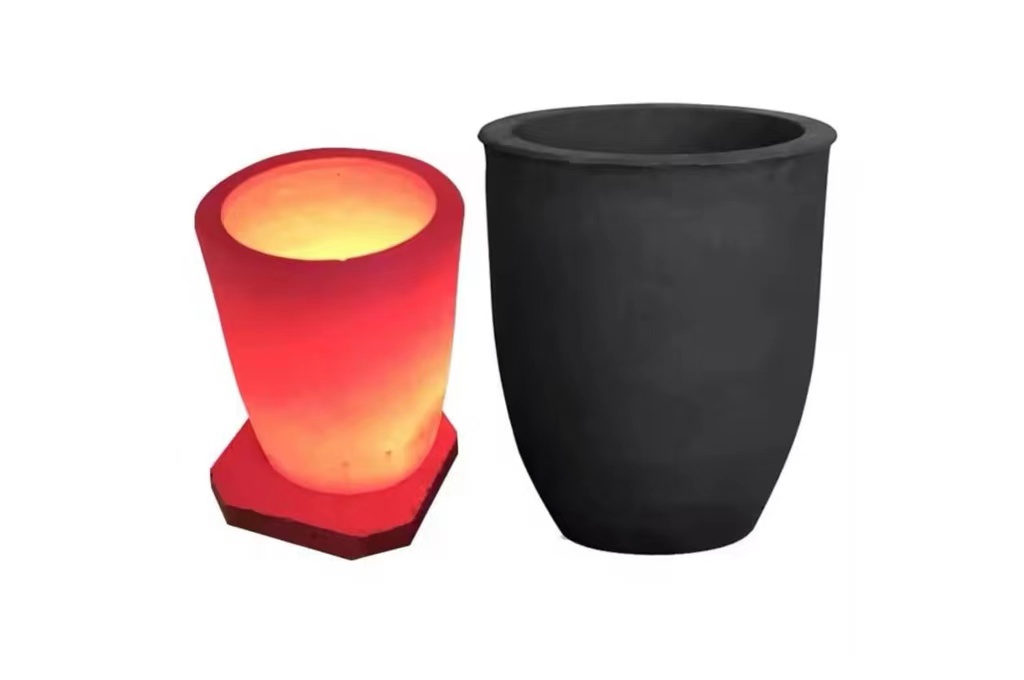Ein Graphittiegel ist ein Schmelzgefäß für Hochtemperaturreaktionen. Er besteht aus Graphitmaterial und hat eine gute Hitze- und Korrosionsbeständigkeit. Er ist in der Chemie, Metallurgie, Glasindustrie und anderen Bereichen weit verbreitet. Zum Beispiel zum Schmelzen von Nichteisenmetallen und Legierungen wie Kupfer, Gold, Silber, Zink usw.
Inhaltsübersicht
Umschalten aufDer Produktionsprozess
Auswahl der Materialien:
Das Material für die Herstellung von Graphit-Tiegeln sollte hochreiner, hochkristalliner Naturgraphit oder künstlicher Graphit sein. Der Kohlenstoffgehalt von Graphit sollte über 99% liegen, und der Gehalt an Verunreinigungen sollte unter 0,2% kontrolliert werden, um die Qualität und Leistung des Produkts zu gewährleisten.
Physikalische Sinterung:
Der Graphit-Tiegel wird durch ein physikalisches Sinterverfahren hergestellt. Zunächst wird das Graphitpulver gesiebt, um Verunreinigungen und Graphit mit ungleichmäßigen Partikeln zu entfernen. Dann wird das Graphitpulver wird in die Form eines Tiegels gepresst und bei hoher Temperatur gesintert, um eine feste Graphitstruktur zu bilden.
Präzisionsbearbeitung:
Der Sintergraphit-Tiegel wird präzisionsgefertigt. Dazu gehören die Veredelung des Aussehens, die Korrektur der Größe, die Oberflächenbehandlung und andere Prozesse. Durch die Bearbeitung und das Polieren hat er ein glattes Aussehen, eine präzise Größe und ist einfach anzuwenden und zu bedienen.
Inspektion und Qualitätskontrolle:
Dazu gehören die Prüfung der Materialzusammensetzung, die Prüfung der Gleichmäßigkeit der Sinterung, die Prüfung der Maßhaltigkeit usw. Gleichzeitig sind auch Prüfungen der chemischen Stabilität und der Hochtemperaturbeständigkeit erforderlich, um die Stabilität und Zuverlässigkeit des Produkts bei Hochtemperaturreaktionen zu gewährleisten.
Kontrolle des Sinterprozesses:
Wir müssen die Sintertemperatur und die Sinterzeit kontrollieren, um sicherzustellen, dass die Kristallstruktur des Graphitmaterials ordnungsgemäß verändert wird und eine harte Struktur bildet. Gleichzeitig sollte während des Sinterprozesses darauf geachtet werden, die Verformung und Rissbildung des Graphittiegels zu verhindern, und es sollten geeignete Maßnahmen ergriffen werden, um die Produktqualität sicherzustellen.
Graphitierung:
Der Schmelztiegel wird bei hoher Temperatur und unter sauerstofffreien Bedingungen einer Graphitierungsbehandlung unterzogen, um ihn in eine stabile Graphitstruktur umzuwandeln.
Oberflächenbehandlung:
Dies dient der Verbesserung der Korrosionsbeständigkeit und der chemischen Stabilität. Gängige Methoden der Oberflächenbehandlung sind Imprägnierung und Beschichtung. Bei der Imprägnierung wird der Graphittiegel in eine bestimmte Flüssigkeit getaucht, um eine Schutzschicht zu bilden. Beschichtung Die Beschichtungsmethode besteht darin, das Beschichtungsmaterial auf die Oberfläche aufzutragen, um eine Schutzschicht zu bilden.
Verpackung und Lagerung:
Nach der Fertigstellung muss es verpackt und gelagert werden, um Produktschäden und Verunreinigungen zu vermeiden. Zu den üblichen Verpackungsmethoden gehören Plastikfolien, Schaumstoffschutz usw. Vermeiden Sie während der Lagerung den Kontakt mit Feuchtigkeit und Chemikalien, halten Sie es trocken und sauber.
Technische Anforderungen an Graphit-Tiegel
Die Arbeitstemperatur des Graphit-Tiegels ist in der Regel über 1000℃, und das Maximum ist über 3000℃. Unter ihnen ist die Brenntemperatur einer der wichtigsten Faktoren, die die Qualität des Tiegels beeinflussen. Je höher die Brenntemperatur ist, desto höher ist die Dichte, die Festigkeit und die Korrosionsbeständigkeit. Aber es wird auch einen größeren Einfluss auf den Preis haben.
Schlussfolgerung:
Der Produktionsprozess und die technischen Anforderungen an Graphittiegel umfassen die Materialauswahl, die physikalische Sinterung, die Präzisionsbearbeitung, die Prüfung und Qualitätskontrolle, die Kontrolle des Sinterprozesses, die Oberflächenbehandlung, die Verpackung und die Lagerung. Nur wenn wir die Qualität und die Prozessbedingungen jedes einzelnen Glieds streng kontrollieren, können wir Graphittiegel mit überlegener Leistung und stabiler Qualität herstellen.

